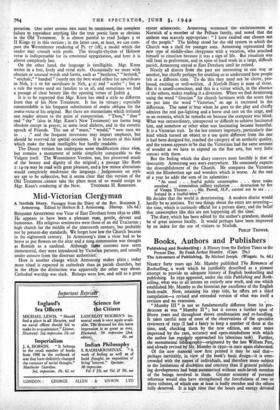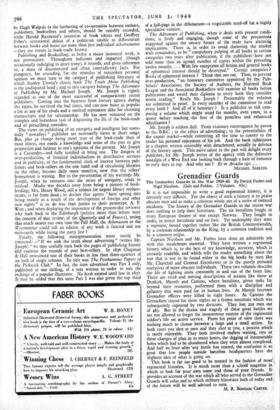Books, Authors and Publishers
The Adventure of Publishing. By Michael Joseph. (Wingate. 8s. 6d.)
.
"Mumby III" is not so fundamentally different from its pre- decessor as was "Mumby II " ; but it covers a further span of fifteen years and throughout shows condensation and re-handling. It takes careful note of most of the observations of the specialist reviewers of 1930 (I had a fancy to keep a number of these at the time, and, checking them by the new edition, am once more impressed by the care, accuracy and open-mindedness with which the author has regul.arly approached his laborious task). Further, the monumental bibriography—originated by the late William Peet, and already revised b37 Mr. Mumby in 1930—is once again elaborated.
Of the new material now first printed it may be said that— perhaps inevitably, in view of the book's basic design—it is over- crowded with the names of individuals, and therefore more subject to the limitations of discretion and courtesy than if general publish- ing developments had been summarised without such lavish mention of the beings involved in them. Greater economy of personal reference would also have strengthened the forcefulness of two or three tributes, of which- one at least is badly overdue and the others fully deserved. It is high time that the hours and energy devoted
NEARLY forty years ago Mr. Mumby published The Romance of Bookselling, a work which he justifiably described as a pioneer attempt to provide an adequate history of English bookselling and publishing. In 1930 appeared, under the title Publishing and Book- selling, what was to all intents an entirely new work, and one which established Mr. Mumby as the historian par excellence of the English book-trade. Now, retaining his 1930 title, he offers yet a third compilation—a revised and extended version of what was itself a revision and an extension.
by Hugh Walpole to the furthering of co-operation between authors, publishers, booksellers and others, should be suitably recorded, while Harold Raymond's invention of book tokens and Geoffrey Faber's sensational defeat of a politician unable to differentiate between books and boots are more than just individual achievements —they are events in book-trade history.
Publishing and Bookselling, as befits a major historical work, is not provocative. Throughout judicious and impartial (though occasionally indulging in quiet irony), it records, and gives coherence to, a mass of disconnected and often contradictory facts. For pungency, for crusading, for the stimulus of outspoken personal opinion we must turn to the category of publishing literature of which Stanley Unwin's classic book The Truth About Publishing is the undisputed head ; and to this category belongs The Adventure of Publishing by Mr. Michael Joseph. Mr. Joseph is rightly regarded as one of the most successful of comparatively recent publishers. Coming into the business from literary agency during the 1930s, he survived the bad times, and can now boast as popular a list as any of his rivals and a merited reputation alike for choosing manuscripts and for salesmanship. He has now ventured on the complex and hazardous task of diagnosing the ills of the book-trade and of prescribing remedies.
The views on publishing of an energetic and intelligent but essen- tially " nowadays " publisher are necessarily views at short range. But, plus fa change being more true of the book-trade than of most others one needs a knowledge and sense of the past to give proportion and balance to one's opinions of the present. Mr. Joseph is a Cassandra—and fully justified in being one. The dangers of over-production, of frenzied individualism in distributive services and in publicity, of the fundamental clash of interest between pub- lishers and book-sellers on the one hand and of circulating libraries on the other, become daily more manifest, now that the sellers' honeymoon is waning. But in the presentation of his warnings Mr. Joseph, when he ventures into the mists of antiquity, tends to mislead. Mudie was decades away from being a pioneer of book- lending; Mrs. Henry Wood, still a subject for urgent library replace- ments, is far from dead ; to declare that agents "have sprung into being mainly as a result of the development of foreign and other new rights" is to do less than justice to their prototype, A. P. Watt; and when deploring the impotence of the present-day reviewer why hark back to the Edinburgh (politics more than letters were the concern of that review, of the Quarterly and of Frasers), seeing that much nearer our own time the Pall Mall, the Athenaeum or the Westminster could sell an edition of any work it fancied and nor necessarily while toeing the party line ?•
Finally, the following misrepresentation must surely be corrected :—" If we seek the truth about advertising" (writes Mr. Joseph) "we may usefully turn back the pages of publishing history arid examine the records of past best-sellers. In 1836 Chapman & Hall announced one of their books in less than three-quarters of an inch of single column. Its title was The Posthumous Papers of the Pickwick Club." In fact, the item advertised was Part I only, pul7lished at one shilling, of a text written to order to suit the etchings of a popular illustrator. No book existed until late in 1837. It may be added that this same Part I was also given the top third
of a,full-page in the 4.thenagum—a respectable send-off tor..* highly speculative venture.
•
The Adventure of Publishing, when it deals with present- &Judi- tions, is lively and engaging, though some of the precautions suggested against the uneasy future of the trade have alarming implications. There is, in order to avoid cluttering the Market with remainders, to be "compulsory pulping of all books in certain categories two years after publication, if the publishers have not sold more than an agrecd number of copies within the preceding twelve months. ... With few exceptions all fiction and general books of ephemeral interest should be destroyed." Certain categories ? Books of ephemeral interest ? Think that one out. Then, to prevent over-production, "an honorary committee appointed by the Pub- lishers' Association, the Society of Authors, the National Book League and the Associated Booksellers will examine all books before publication -and award their diploma to every book they Consider worth reading." Really Mr. Joseph ! Presumably the volumes are submitted in proof. Is every member oT the committee to read every book ? And all of it honorary ? Is a publisher to risk com- posing a volume which- might stand for months, even years, in a queue before reaching -the first of the penniless and exhausted adjudicators ?
Mr. Joseph is seldom dull. From visionary extravagance he passes to the B.B.C. ; to the ethics- of advertising ; to the potentialities of the export market—while contriving all the time to convey to the reader his personal enjoyment of his job. And the book culminates in a chapter written ostensibly with detachment, actually in defence of the literary agent. This naive salute to the past will delight every publisher,' for Mr. Joseph writes of the agency with the defensive nostalgia of a West End star looking back through a haze of romance to early days in rep. And why not ? Et in Arcadia ego. . . .
MICHAEL. SADLEIR.



































 Previous page
Previous page